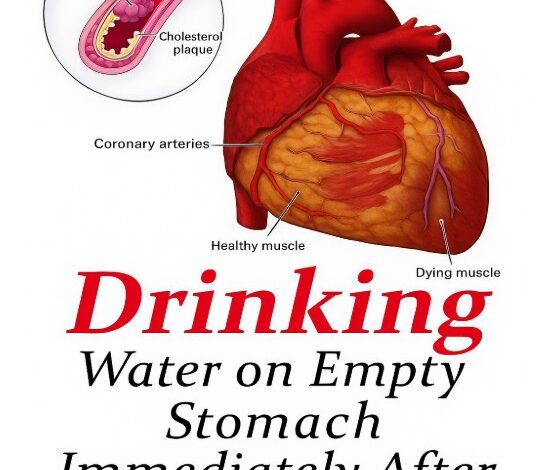
Water is the foundation of life. It makes up around 60% of the human body and is vital for nearly every biological function — from carrying nutrients and oxygen through the bloodstream to regulating body temperature, lubricating joints, and supporting digestion. Without enough of it, nothing in the body runs as it should.
Over the years, a growing trend has emerged online and in wellness circles: drinking water first thing in the morning, often promoted as a simple but powerful health ritual. Advocates claim it detoxifies the body, boosts metabolism, aids digestion, clears the skin, and even helps with weight loss. But how much of that is fact, and how much is myth?
Let’s take a closer look at what really happens when you drink water in the morning — and what your body actually needs.
When you wake up, your body is naturally somewhat dehydrated. You’ve gone six to eight hours without drinking anything, and you’ve lost some water through breathing and perspiration overnight. Having a glass of water after waking helps replenish that deficit. It can make you feel more alert, lubricate your throat, and kick-start the digestive system for breakfast. So yes, there’s a genuine benefit to drinking water in the morning — but it’s not magic.
Many social media “wellness hacks” exaggerate what water can do. One of the most popular claims is that drinking water early in the day “flushes toxins” from the body. The truth is, your body doesn’t need that kind of help. Your liver and kidneys handle detoxification automatically and efficiently — 24 hours a day, not just in the morning. Water supports their function, but it doesn’t amplify it depending on the time of day.
Another common belief is that drinking water before breakfast jump-starts metabolism. While hydration does play a small role in metabolic efficiency — dehydration can make metabolism slightly less effective — there’s no solid scientific proof that drinking water first thing in the morning has any special metabolic advantage compared to drinking it later.
That said, water can indirectly help with weight management. Studies have found that drinking a glass of water before meals may reduce overall calorie intake by creating a mild sense of fullness. It can help curb unnecessary snacking or overeating, particularly for people who mistake thirst for hunger. Still, the timing — morning, noon, or night — matters far less than consistency.
One trend that has gained global attention is Japanese Water Therapy, which encourages drinking four to five glasses (roughly 640–800 ml) of room-temperature water immediately upon waking, before eating anything. Followers claim it improves digestion, purifies the blood, and even prevents diseases like diabetes and hypertension. While there’s no scientific evidence supporting these claims, the practice does succeed in one thing: reminding people to drink more water. For many who chronically under-hydrate, that alone can make them feel better.
But extremes can backfire. Consuming large amounts of water all at once — particularly several glasses in rapid succession — can overwhelm your kidneys and dilute electrolytes, potentially leading to hyponatremia, or water intoxication. This condition, though rare, can cause nausea, confusion, seizures, and in severe cases, death. The key is moderation. Hydration should be steady, not forced.
The body has an elegant way of signaling when it needs water — thirst. Ignoring that signal is the real problem, not failing to drink water at a specific time. The average adult loses about 2 to 3 liters of fluid daily through normal activities like breathing, sweating, and urination. To maintain balance, that fluid must be replaced.
The widely known “8×8 rule” — eight 8-ounce glasses of water per day — is an easy guideline, but it’s not a one-size-fits-all number. Hydration needs depend on several factors:
- Body size: Larger individuals naturally require more water.
- Climate: Hot or humid environments increase sweat loss.
- Activity level: Exercise or physically demanding work raises fluid needs.
- Diet: High-protein or high-fiber diets demand more hydration for digestion.
- Health conditions: Illnesses, certain medications, and pregnancy can alter water requirements.
Listening to your body is often the best guide. Pale yellow urine usually indicates proper hydration; darker shades suggest you need more fluids.
Drinking water in the morning can have a psychological benefit as well. It’s a small, consistent act of self-care — one that can set the tone for a more mindful day. Many people find that starting the morning with a glass of water leads to better hydration habits throughout the day. It also helps establish a healthy rhythm: drink water, move your body, and nourish yourself before reaching for caffeine or screens.
However, some people report discomfort if they drink large amounts of water right before eating. Too much liquid can dilute stomach acid, which may affect digestion and nutrient absorption, particularly in individuals with sensitive stomachs. If that’s the case, smaller sips throughout the morning — rather than one big gulp at once — may be a better option.
Experts agree that when you drink water matters far less than how much you drink consistently. A well-hydrated person feels more energetic, can focus better, and maintains steadier mood and body temperature. Dehydration, even mild, can cause fatigue, headaches, dry mouth, and reduced cognitive performance.
The best approach is simple: spread your water intake evenly through the day. Start with a glass in the morning if it feels good, sip throughout work or school, and have another before or after meals as needed. If you’re physically active, drink water before, during, and after exercise. If you’re in a dry or hot environment, increase your intake.
You can also get hydration from foods — fruits and vegetables like cucumbers, watermelon, spinach, and oranges have high water content. Herbal teas, soups, and even coffee contribute to daily fluid intake. The myth that coffee or tea “dehydrates you” has been largely debunked; while caffeine is mildly diuretic, the water in those drinks more than compensates for that effect.
Hydration isn’t just about avoiding thirst — it’s about optimizing how you feel. Well-hydrated muscles perform better, skin looks healthier, digestion runs smoother, and mental clarity improves. Over time, consistent hydration supports kidney function, heart health, and energy balance.
What you should avoid is treating water as a miracle cure or following unverified “detox” programs. The human body already has an advanced built-in detox system — your liver, kidneys, lungs, and skin. No drink, not even water, can “cleanse” you faster than those organs already do.
If you want to make your morning glass of water meaningful, make it part of a balanced habit rather than a superstition. Use that moment to pause, breathe, and prepare for your day. Add a squeeze of lemon if you like the taste — not because it “alkalizes” your body (it doesn’t), but because it makes hydration enjoyable and sustainable.
At its core, drinking water in the morning is less about timing and more about intention. You’re choosing to nourish your body, even in a small way. And while it may not transform your metabolism or magically flush toxins, it does support your body’s most fundamental processes.
So yes — have that morning glass of water. But don’t stop there. Keep going throughout the day. Your body doesn’t need rituals; it needs consistency.
Hydration is not about a trend — it’s about respect. Respect for the body that works tirelessly for you, every moment, drop by drop.



